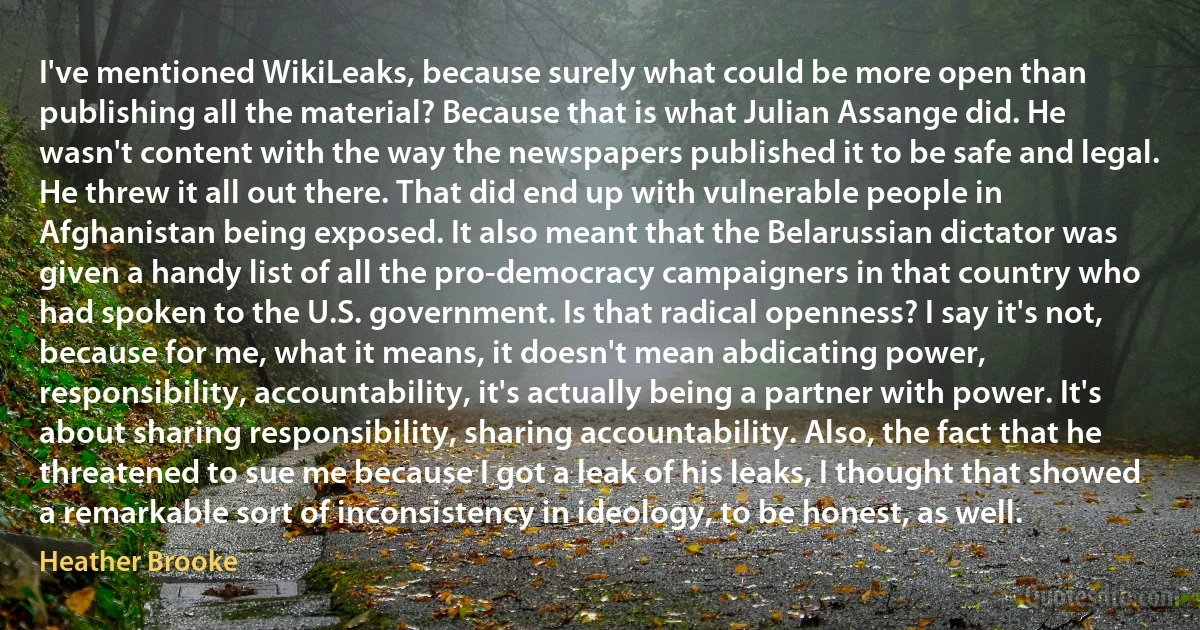
I've mentioned WikiLeaks, because surely what could be more open than publishing all the material? Because that is what Julian Assange did. He wasn't content with the way the newspapers published it to be safe and legal. He threw it all out there. That did end up with vulnerable people in Afghanistan being exposed. It also meant that the Belarussian dictator was given a handy list of all the pro-democracy campaigners in that country who had spoken to the U.S. government. Is that radical openness? I say it's not, because for me, what it means, it doesn't mean abdicating power, responsibility, accountability, it's actually being a partner with power. It's about sharing responsibility, sharing accountability. Also, the fact that he threatened to sue me because I got a leak of his leaks, I thought that showed a remarkable sort of inconsistency in ideology, to be honest, as well.
Heather BrookeRelated topics
accountability content country dictator end given government ideology inconsistency julian mean open openness people power safe say sort speak thought throw way well means afghanistanRelated quotes
It is remarkable how much of the utilised information men possess has been derived from the observations of astronomers. The mechanism of the universe was known before Harvey discovered the circulation of the blood, or Watt constructed a steam engine. The astronomers seem to have been the pioneers of every branch of human knowledge. The Old and the New Testament open astronomically: "In the beginning God created the heaven and the earth" (Gen., i., I). "The wise men from the east came to Jerusalem, saying, where is He that is born King of Jews? for we have seen His star in the east" (Matt., ii., 2). It must be remembered that the science of astronomy in one important respect differs from all other sciences. Astronomers are observers only - they ascertain causes by watching effects. They cannot interfere with or alter the causes in operation.

William Crookes
It is natural that I should bear entire responsibility for the war in general, and, needless to say, I am prepared to do so. Consequently, now that the war has been lost, it is presumably necessary that I be judged so that the circumstances of the time can be clarified and the future peace of the world be assured. Therefore, with respect to my trial, it is my intention to speak frankly, according to my recollection, even though when the vanquished stands before the victor, who has over him the power of life and death, he may be apt to toady and flatter. I mean to pay considerable attention to this in my actions, and say to the end that what is true is true and what is false is false. To shade one's words in flattery to the point of untruthfulness would falsify the trial and do incalculable harm to the nation, and great care must be taken to avoid this.

Hideki Tōjō
This trendy, new crowd, which likes to do everything with committees, really believes that all it takes to make anything legal and OK is a majority. I guess they call that democracy. When the majority is what it has become in the United States today, a better name is mobocracy. But really, it's much worse than mob rule. It is rule by a self-appointed elite of utterly evil and destructive people who have in their hands the tools for controlling and guiding the mob. They're pretty cocky now -- so cocky, in fact, that they're making statements of the sort I've quoted today. They're cocky because they believe that no one can take away from them their tools for controlling the mob, and that as time passes and America becomes darker and more degenerate, their grip on the mob will only become firmer. Our job is to prove them wrong. It's a big job, and we'd better get started.

William Luther Pierce
Rushdie had written a book of nonfiction which offered critical but decided support to the Nicaraguan revolution. He had also been eloquent about the rights of the ever-relegated Palestinians. What more natural, when he was threatened with assassination by contract, than to jubilate about a terrorist-symp who had been caught in his own logic? I counted some ten newspaper and magazine columns from the Podhoretz school, all making this same point in the same words - demonstrating the impressive Zhdanovite discipline that is the special mark of the faction. All of them seemed to regard the affair as some sort of heavenly revenge for the sin of radical promiscuity; much as they have represented the AIDS crisis as a vengeance as on sixties morality. The ethical nullity of these positions never got beyond mere gloating, and will one day help to illustrate the essential distinction between irony and brutish sarcasm.

Christopher Hitchens
In introducing the personal computer to the classroom, we shall be breaking a four-hundred year-old truce between the gregariousness and openness fostered by orality and the introspection and isolation fostered by the printed word. Orality stresses group learning, cooperation, and a sense of social responsibility... Print stresses individualized learning, competition, and personal autonomy. Over four centuries, teachers, while emphasizing print, have allowed orality its place in the classroom, and have therefore achieved a kind of pedagogical peace between these two forms of learning, so that what is valuable in each can be maximized. Now comes the computer, carrying anew the banner of private learning and individual problem-solving. Will the widespread use of computers in the classroom defeat once and for all the claims of communal speech? Will the computer raise egocentrism to the status of a virtue?

Neil Postman
